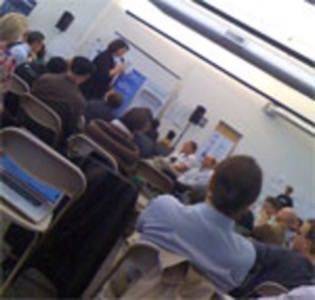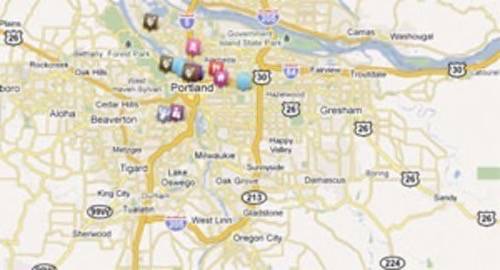Similar to the real-time stream itself, ReadWriteWeb’s Real-Time Web Summit dares to tackle a collective stream of consciousness. As the official live bloggers, the ReadWriteWeb team is aggregating some of today’s highlights. One of the great things about this event is that many of the disparate voices in the stream are meeting face to face (or in the flesh) for the first time. Naturally, this morning’s event sessions included a discussion about location-based real-time data.

Led by WhereCamp founder Anselm Hook, this session dealt with what Waze’s Diann Eisnor coined “transactional cartography.” Rather than being used simply to collect data from an unruly river, we agreed that the strength of location-based data is that it is actionable. The geo-locational stream solves a number of physical problems including:

1. Getting Around: Users can move from place to place by obtaining real-time data on traffic jams through sites like Waze.
2. Meeting Others: Real-time updates from friends allow users to organize meetings through sites like Travel and Gather and Platial.
3. Finding Items and Services: Real-time services allow users to gain instant information on nearby services and products. For example, users can get free food through updates from Portland-based Urban Edibles
While real-time location-based information could greatly improve how we navigate the world, the unique facets of this type of stream also bring with them a number of issues.
From a business standpoint, data is unfortunately often treated like a closed commodity, used by commercial companies to fund development. Nevertheless, for consumers to get a holistic view of the stream, it seems as if these decentralized services need to be merged.
From a consumer standpoint, users need to broker trust between themselves before meetings can take place, and sometimes this trust isn’t easy to verify. According to SocialText’s Ross Mayfield, the barriers to adoption include privacy, safety and taste filtering. As more real-time location data becomes available, users need better tools to filter information and friend feeds that are pushed to them.
What Is the Point?
Perhaps the most important component of this discussion is why people are willing to share their location-based information. One fear about the real-time Web is that it allows anonymous weirdos to stalk you. However, many users see location-based sharing as “strength in numbers” and a vessel for collective solutions. While some speculate that we are sharing our whereabouts simply to recreate a sense of community, others believe that we are building up a grassroots marketplace. In your opinion what are the unique pros and cons of the location-based real-time Web?





















